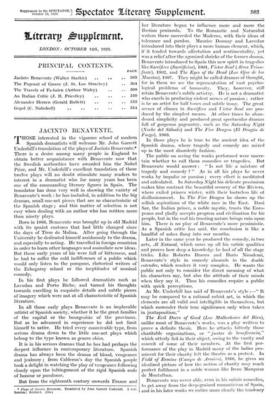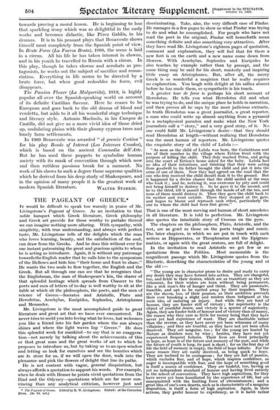JACINTO BE NAVENTE.
THOSE interested in the vigorous school of modern Spanish dramatists will welcome Mr. John Garrett Underhill's translation of the plays of Jacinto Benavente.* There is a desire among many people in England to obtain better acquaintance with Benavente now that the Swedish authorities have awarded him the Nobel Prize, and Mr. Underhill's excellent translation of these twelve plays will no doubt stimulate many readers to interest in a dramatist who for many years has been one of the commanding literary figures in Spain. The translator has done very well in showing the variety of Benavente's work : he has included, in addition to the big dramas, small one-act pieces that are so characteristic of the Spanish stage ; and this matter of selection is not easy when dealing with an author who has written more than ninety plays.
Born in 1866, Benavente was brought up in old Madrid with its quaint customs that had little changed since the days of Tirso de Molina. After going through the University he dedicated himself assiduously to the drama, and especially to acting. He travelled in foreign countries in order to learn other languages and assimilate new ideas. But those early years of his were full of bitterness, and he had to suffer the cold indifference of a public which would only listen to the pompous, rhetorical writers of the Echegaray school or the ineptitudes of musical comedy.
In his first plays he followed dramatists such as Lavedan and Porto Riche, and turned his thoughts towards excelling in exquisite details and subtle pieces of imagery which were not at all characteristic of Spanish literature.
In all those early plays Benavente is an implacable gatirist of Spanish society, whether it be the great families of the capital or the bourgeoisie of the provinces. But as he advanced in experience he did not limit himself to satire. He tried every conceivable type, from serious drama down to the little one-act plays which belong to the type known as genero chico.
It is in his serious dramas that he has had perhaps the deepest influence in contemporary literature. Spanish drama has always been the drama of blood, vengeance and jealousy ; from Calderon's day the Spanish people took a delight in watching the play of vengeance following closely upon the infringement of the rigid Spanish code of honour or pundonor.
But from the eighteenth century onwards France and '1' PIMP of Jacinto Benavente. Translated by John Garrett UnderbM. 3 rob. London: Scribner. i30a4 her literature began to influence more and more the Iberian peninsula. To the Romantic and Naturalist writers there succeeded the Moderns, with their ideas of tolerance and pardon. Maurice Donnay and Lavedan introduced into their plays a more human element, which, if it tended towards affectation and sentimentality, yet was a relief after the agonized shrieks of the former drama. Benavente introduced to Spain this new spirit in tragedies like Sacrifices (Saerificios), 1901, Victor Soul (Alma Triun- fante), 1902, and The Eyes of the Dead (Los Ojos de los Muertos), 1907. They might be called dramas of thought, for in them we see the representation of vast psycho- logical problems of humanity. They, however, still retain Benavente's subtle artistry. He is not a dramatist who excels in producing violent scenes of passion ; rather is he an artist for half tones and subtle irony. The great scenes of climax in Sacrifices and Victor Soul are pro- duced by the simplest means. At other times he aban- doned simplicity and produced great spectacular dramas full of gorgeous pageantry, such as the Saturday Night (Noche del S'abado) and The Fire Dragon (El Dragon de Fuego), 1903.
In those plays he is true to the ancient idea of the Spanish drama, where tragedy and comedy are mixed up in the most disorderly fashion.
The public on seeing the works performed were uncer- tain whether to call them comedies or tragedies. But Benavente would answer : "Is not life a mixture of tragedy and comedy ? " As in all his plays he never works by impulse or passion ; every effect is meditated and calculated. In Saturday Night his delicate pessimism makes him contrast the beautiful scenery of the Riviera, where exiled princes winter, with their lustreless life of disillusionment. In The Fire Dragon he shows up the selfish aspirations of the white race in the East. Dani Sar, the Indian prince, a noble mystic, trusts the Euro- peans and gladly accepts progress and civilization for his people, but in the end his trusting nature brings ruin upon him. There is no play of Benavente's more pessimistic. As a Spanish critic has said, the conclusion is like a handful of ashes flung into our mouths.
Later in the same year he produced the comedy, in two acts, Al Natural, which sums up all his satiric qualities and proves bow deep a knowledge he had of all the stage tricks. Like Roberto Bracco and Dario Nicodcmi, Benavente's style in comedy abounds in the double entendre, which renders it very complex. He wants the public not only to consider the direct meaning of what his characters say, but also the attitude of their minds when they say it. Thus his comedies require a public with quick perceptions.
As Mr. Underhill has said of Benavente's style :—" It may be compared to a rational cubist art, in which the elements are all valid and intelligible in themselves, but which surrender their true significance only when taken in juxtaposition."
The Evil Doers of Good (Los Malhechores del Bien), unlike most of Benavente's works, was a play written to prove a definite thesis. Here he attacks bitterly those charitable organizations, or "juntas de beneficencia," which utterly fail in their object, owing to the vanity and conceit of some of their members. At the first per- formance of the play in Madrid many of the ladies pro- minent for their charity left the theatre as a protest. In Field of Ermine (Campo de Armiiie), 1916, he gives an idealized picture of how the notion of charity may reach perfect fulfilment in a noble woman like Irene Marquess de Montalban.
Benavente was never able, even in his satiric comedies, to get away from the deep-grained romanticism of Spain, and in his later works we notice more clearly the tendency towards proving a moral lesson. He is beginning to lose that sparkling irony which was so delightful in the early works and becomes didactic, like Perez Galeltis, in his dramas. It is in his peasant plays that Benavente shows himself most completely from the Spanish point of view. In Brute Force (La Fuerza Bruta), 1908, the scene is laid in a circus. All his life he has taken interest in clowns, and in his youth he travelled to Russia with a circus. In this play, though he takes clowns and acrobats as pro- tagonists, he works out the subject of sacrifice and renun- ciation. Everything in life seems to be directed by a brute force, but when good redoubles its force, evil disappears.
The Passion Flower (La Malquerida), 1913, is highly popular all over the Spanish-speaking world on account of its definite Castilian flavour. Here he ceases to be European and goes back to the old drama of blood and vendetta, but adds to it all his wonderful stage technique and literary style. Antonio Machado, in his Campos de Castilla, did not give us a more vivid idea of those dried up, undulating plains with their gloomy cypress trees and lonely farm settlements.
In 1909 Benavente was awarded "el premio Cortina" for his play Bonds of Interest (Los Intereses Creados), which is based on the ancient Commedia dell'Arte. But he has used these puppets to symbolize human society with its mask of convention through which now and then ruthless passions break for a moment. No work of his shows to such a degree those supreme qualities which he derived from his deep study of Shakespeare, and in the opinion of many people it is the greatest work of



























































 Previous page
Previous page